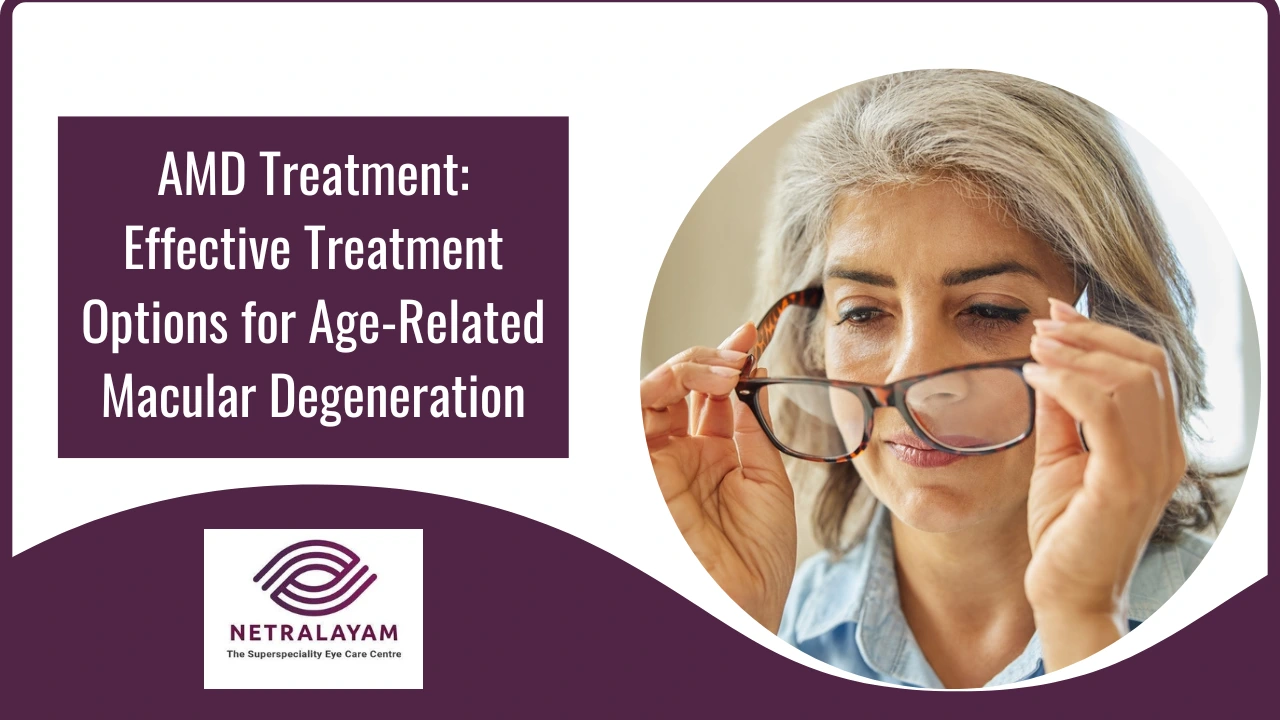Age-Related Macular Degeneration (AMD) is a leading cause of vision loss among individuals over 50 years old, affecting millions worldwide. This progressive condition damages the macula, the central part of the retina responsible for sharp vision, making everyday tasks like reading, recognizing faces, and driving difficult. While AMD cannot be fully reversed, early detection and appropriate treatment can slow its progression and help preserve vision. So, let’s discuss the early signs of macular degeneration and treatments of AMD.
Understanding AMD: What is Age-Related Macular Degeneration?
AMD is a degenerative eye condition that affects the macula, leading to gradual vision loss. It comes in two primary forms:
Dry AMD (Non-Neovascular AMD)
- The most common form, accounting for 85–90% of cases.
- Causes gradual breakdown of macular cells.
- Early signs include blurry vision, difficulty seeing in low light, and faded colors.
Wet AMD (Neovascular AMD)
- Less common but more severe and fast-progressing.
- Characterized by abnormal blood vessel growth beneath the macula, leading to leakage and vision distortion.
- Can cause rapid and significant vision loss if left untreated.
Who is at Risk?
- Age: Risk increases significantly after 50 years.
- Genetics: Family history plays a role.
- Smoking: Smokers have up to four times the risk of developing AMD.
- Diet & Lifestyle: Poor nutrition, high blood pressure, and obesity can contribute to progression.
Early Signs of Macular Degeneration and the Importance of Timely Treatment
Common Symptoms of AMD
- Blurry or distorted vision (straight lines may appear wavy).
- Difficulty reading even with good lighting.
- Dark or empty spots in central vision.
- Diminished color perception.
How is AMD Diagnosed?
Early detection is key to slowing AMD progression. Common diagnostic tests include:
- Amsler Grid Test: A simple grid pattern test to detect vision distortion.
- Optical Coherence Tomography (OCT): A detailed imaging scan to assess macular damage.
- Fluorescein Angiography: A dye-based test used to identify abnormal blood vessels in wet AMD.
Can AMD Be Reversed? Understanding Treatment Limitations
- AMD cannot be cured or reversed, but its progression can be managed with early intervention and lifestyle changes.
- Treatments aim to slow vision loss and, in some cases, stabilize vision.
- Dry AMD progresses gradually, while wet AMD requires immediate medical attention to prevent rapid deterioration.
How to Slow Down Macular Degeneration
While AMD progression cannot be stopped completely, certain lifestyle changes can help protect remaining vision.
1. Lifestyle Modifications for Eye Health
- Quit Smoking: Smoking doubles the risk of AMD.
- Follow a Nutrient-Rich Diet:
- Leafy greens (spinach, kale) rich in lutein and zeaxanthin.
- Omega-3 fatty acids (salmon, flaxseeds) –support retinal health.
- Antioxidants (berries, nuts) help combat oxidative damage.
- Exercise Regularly: Improves blood circulation and supports overall eye health.
2. Eye Supplements: AREDS2 Formula
The AREDS2 study found that specific vitamins and minerals help slow AMD progression:
- Vitamin C & E – Protect against oxidative stress.
- Zinc & Copper – Support eye tissue health.
- Lutein & Zeaxanthin – Help filter harmful blue light.
3. Protective Measures for Eye Health
- Wear UV-Protected Sunglasses: Shields eyes from harmful UV rays.
- Use Blue Light Filtering Glasses: Reduces strain from digital screens.
4. Regular Eye Exams
- Annual screenings can detect AMD progression early.
- Self-monitoring with an Amsler grid can help track vision changes.
Effective Treatment Options for AMD
1. Dry AMD Treatment Options
- Nutritional Therapy: Certain supplements have been shown to reduce the risk of vision loss.
- Low Vision Aids: Magnifiers, adaptive technology, and larger print materials can help improve daily life.
2. Wet AMD Treatment Options
- Injections: Few injections and medications can help slow disease progression by reducing abnormal blood vessel growth.
- Laser Therapy & Photodynamic Therapy (PDT): Laser treatments can seal leaking blood vessels to slow vision loss.
3. Emerging and New Treatment for AMD
Ongoing advancements in medical research are paving the way for new and more effective treatments for Age-Related Macular Degeneration (AMD). While no definitive cure exists yet, several promising therapies are being explored to slow progression and potentially restore vision.
- Stem Cell Therapy: Researchers are investigating the use of stem cells to regenerate damaged retinal cells, offering hope for future AMD treatments.
- Gene Therapy: Studies are focused on correcting genetic mutations linked to AMD, potentially preventing or slowing disease progression.
- New Treatment Approaches: Scientists are exploring complement inhibitors, oral medications, and long-lasting injectable treatments to improve AMD outcomes.
Numerous clinical trials and innovative research projects continue to push the boundaries of AMD treatment. As advancements unfold, these emerging therapies may offer enhanced options for patients in the near future.
Conclusion
While AMD cannot be permanently reversed, early diagnosis and proactive management can slow its progression and help preserve vision for years to come.
If you or a loved one notice any signs of AMD, schedule an eye exam as soon as possible. Regular monitoring, lifestyle changes, and medical treatments can make a significant difference in preserving sight.
Need Expert AMD Care? Schedule a Consultation with Netralayam
Protecting your vision starts today. Book an appointment with Netralayam’s eye specialists for a comprehensive eye exam and personalized AMD treatment plan.

